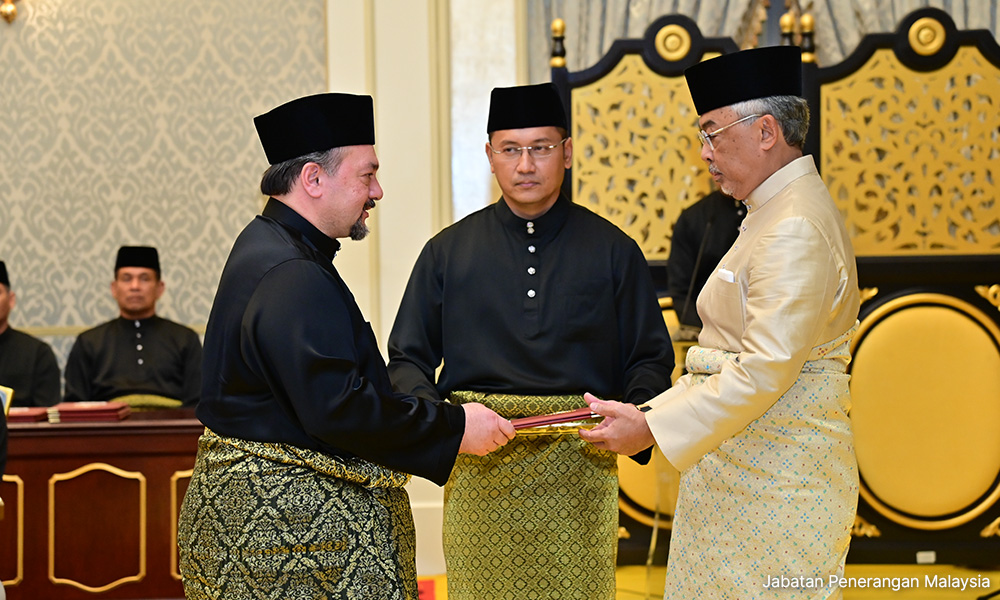Economists have welcomed the appointment of Employees Provident Fund (EPF) CEO Amir Hamzah Azizan as second finance minister in Prime Minister Anwar Ibrahim’s cabinet reshuffle on Tuesday.
Sunway University economics professor Yeah Kim Leng said being a technocrat with a proven track record, Amir’s appointment would greatly complement Anwar’s efforts to restore trust and integrity in the country’s financial administration.
“He will play a critical role in supporting the finance minister (Anwar) to tackle key fiscal vulnerabilities such as high debt and fiscal debt levels amid high spending commitments.
“He and Anwar will have an unenviable task of seeing through the implementation of critical fiscal reforms planned over the next few years beginning with the fuel subsidy rationalisation next year,” Yeah told Malaysiakini.
Universiti Tun Abdul Razak economist Barjoyai Bardai concurred, saying Amir was a good choice who would give the government an infusion of professionalism.
“This is the right person with a good background and a lot of experience in managerial roles with corporate companies. He also has the important expertise of managing a social protection institution like the EPF.

“This covers not only workers but the whole population, and is a critical role of financial management for social welfare purposes,” said Barjoyai.
A graduate of Syracuse University, Amir Hamzah joined the EPF in 2021 and is the eldest son of former Petronas chairperson Azizan Zainul Abidin.
Before becoming EPF CEO in 2021, Amir helmed Tenaga Nasional Bhd and served in corporate roles with the Shell Group of Companies, MISC Berhad, Petronas Dagangan Bhd, and Khazanah Nasional Bhd, among others.
“I believe we will see him on a particular mission to consolidate Malaysia’s government-established fund management companies like Ekuinas and Permodalan Nasional Berhad.
“Perhaps we might also see him consolidate holdings in GLCs, which make up a significant percentage of stock on Bursa Malaysia.
“This is a good choice, and I hope it will lead to a new beginning,” added Barjoyai.
Why bring in a novice?
However political economist Edmund Terence Gomez struck a different note and questioned if Amir’s deep knowledge of the GLC ecosystem was going to be of much benefit.
“Anwar has been facing growing dissent and realised that he cannot wear the two hats of prime minister and finance minister. But if he wants to make such a move, we already have a technocrat sitting there in (Investment, Trade, and Industry Minister) Tengku Zafrul Tengku Abdul Aziz.
“Why bring in a novice when Zafrul is already there? What does Amir have that will really help us?” he asked.
Gomez also said it was important to look at the background of Anwar’s ascendancy to the premiership, during which he made it very clear that an anti-corruption drive was a major hallmark of his administration.
“If we look back over the years at the LCS scandal, Tabung Haji, the list goes on and a lot of it was part of the GLC ecosystem. Even billions of EPF funds were used in the Pembinaan PFI scandal, not under Amir’s watch of course.

“Amir is a very approachable and knowledgable person, but I’m not sure he will be able to carry out the much-needed reforms and structural changes to overcome the corruption,” said Gomez.
He added that under former prime minister Abdullah Ahmad Badawi, major reforms were launched in 2004 through the GLC transformation plan.
“The plan was to get the politicians out and put in place competent and qualified professionals. But ultimately, the professionals remained subservient to the minister, the best example being what happened with 1MDB,” added Gomez.
Rafizi and Zafrul
The economists also noted that Anwar chose to retain Economy Minister Rafizi Ramli as well as Zafrul, saying he appeared to be backing those in charge of steering economic planning.
Yeah said both have done well as evidenced by the roll-out of the Madani Economy Framework, Mid-Term Review of the 12th Malaysia Plan, National Energy Transition Road Map (NETR), and New Industrial Master Plan (Nimp).
“In addition, the economy minister can be credited with policy innovations such as the Progressive Wage Model (PWM) and various income enhancement initiatives for the low-income groups while the Miti minister is associated with the strong pipeline of FDI commitments,” he said.
Yeah also called for effective communication coupled with closer consultation with key stakeholders from both the public and private sectors including trade bodies, industry associations, and non-government organisations.
This is critical for the successful implementation of the various policies and plans, he said.
Barjoyai added that it is possible Anwar’s hands were tied in the matter.
“It looks like, in the case of Tengku Zafrul, the PM has no choice. Even in the case of Rafizi, he is PKR deputy president and not doing that badly. He is a thinker and a planner, but we need more doers,” he said. - Mkini




No comments:
Post a Comment
Note: Only a member of this blog may post a comment.